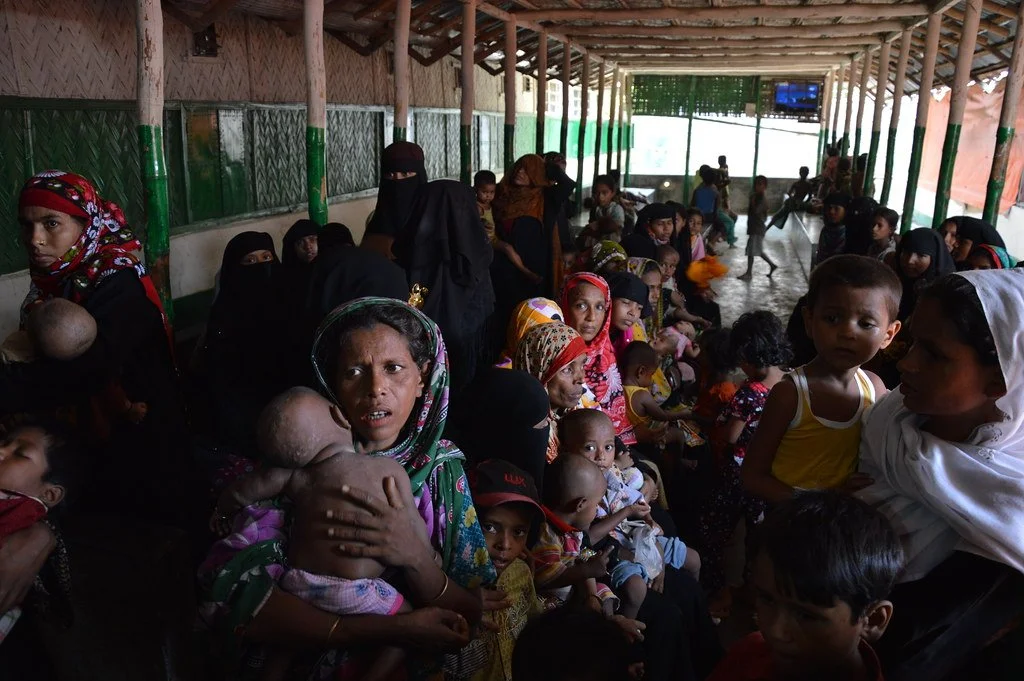Too Little Action and Far Too Late for the Rohingya
By Jackson Andrews ‘25
Beginning in 1982 when Myanmar passed a law banning the Rohingya ethnic group from obtaining citizenship, the group’s existing violent oppression has stepped up into legalized discrimination. Myanmar has always been a state stricken with ethnic hatred and oppression of smaller groups. Myanmar is home to one of the largest and most topical refugee crises in the world, having a fled refugee population totaling around one million people which gives them the 4th largest refugee population in the world. And of that monumental sum, nearly every single Myanmar refugee is a part of the Rohingya group. For this reason, the main Rohingya refugee center in Bangladesh is now the single largest refugee camp in the world. And the refugee population will continue to grow so long as the active Myanmar government continues its reign of terror over the population, taking innocent lives, destroying property, and denying them basic needs and rights. COVID-19 was especially devastating for all refugee populations, and the Rohingya population was launched further into turmoil. This is largely due to the fact that aid organizations were significantly more limited in their capacity to help. Supply chain issues and economic collapse made it much more difficult to get aid materials like bedding, medicine, and food to refugees. Travel bans made it nearly impossible to amass enough volunteers, which forced learning centers and more advanced refugee development programs to close down.
The persecution of the ethnic group is based entirely on race and religion. The leading religion in Myanmar is Buddhism and the state is ethnically dominated by the Shan, Rhakine, and Mon groups. The Rohingya ethnicity is one dominated by Islam, surviving in a nation in
which it is unwelcome. It has always been easy for developing governments to scapegoat an unpopular minority, and in this case, it is the Muslim Rohingya, just as it is the Muslim Uyghurs are in China. Although the Constitution of Myanmar contains an article on religious freedom for all citizens, the treatment of the Rohingya for the past three decades tells a different story. The state government gets around the constitution by revoking Rohingya citizenship.
And while over 9,000 Rohingya people have died since 1982, the event has still garnered little to no international recognition or aid. It constitutes the displacement of a million people and still has lingered on with no action for decades. Numerous states have publicly spoken out against genocides and wars of more minimal consequence, and have sent teams and funds to
non-state groups across the world to aid smaller populations. Finally, in late March of 2022, the United States government has officially recognized the state of events in Myanmar as a genocide of the Rohingya ethnicity. What does this mean exactly? Not a whole lot. It means that the Rohingya may now be more on the minds of American diplomats and may receive more aid from the American humanitarian system, but nothing has yet been pledged. And given the state of events elsewhere in the world, it is unlikely that the United States will turn their focus away from Europe for the time being. What's most unfortunate is that the United States came close to moving forward with recognition of the genocide during the Trump administration, but after much deliberation, they decided not to issue a formal declaration.
The declaration does leave a little bit of hope for the future, no matter how late it has come. Sure, sooner action may have saved or changed the lives of hundreds of thousands of people, but by instituting a formal recognition of the atrocities of the government of Myanmar, the United States opened the door for change. In conjunction with the use of international law and cooperation with external powers ready to stop the genocide and potential war crimes that took place during 2021’s failed coup attempt by a Rohingya leader, things may change in the future. It is already enough of a refugee crisis, but if coup attempts keep occurring then the genocide will transform into a full-blown ethnic war, something that history has shown to be incredibly bloody. Regardless, intelligence shows that the past year of genocide has multiplied to levels unseen before. Up to 1,500 of the 9,000 total casualties occurred in the last year of fighting alone. This is largely due to increased protesting during the coup but still does not bode well for the future of the conflict. With the assistance of humanitarian states and America’s genocide declaration, hopefully, the country can stabilize.



